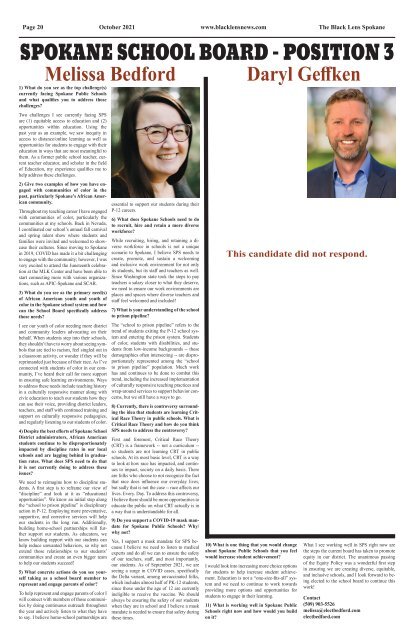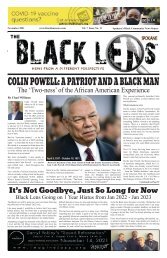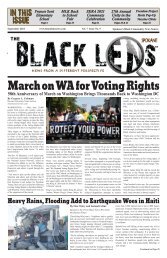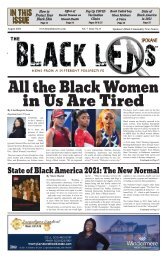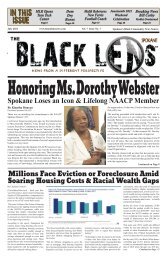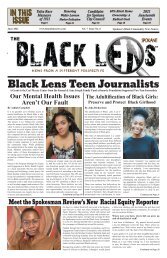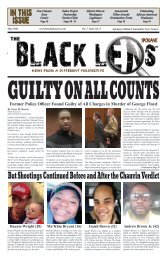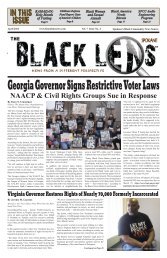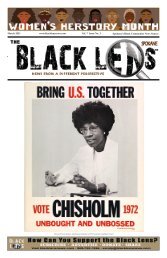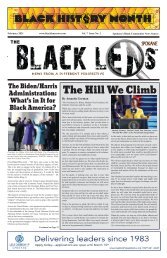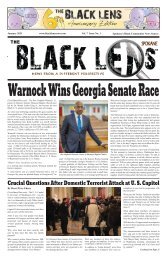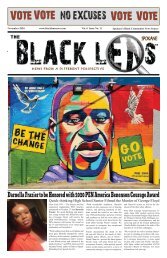Black Lens - October 2021
The Black Lens in an independent , community newspaper, published monthly and based in Spokane, WA, that covers then news, people, information and issues that are of importance to the Black community.
The Black Lens in an independent , community newspaper, published monthly and based in Spokane, WA, that covers then news, people, information and issues that are of importance to the Black community.
Create successful ePaper yourself
Turn your PDF publications into a flip-book with our unique Google optimized e-Paper software.
Page 20<br />
<strong>October</strong> <strong>2021</strong><br />
www.blacklensnews.com<br />
The <strong>Black</strong> <strong>Lens</strong> Spokane<br />
SPOKANE SCHOOL BOARD - POSITION 3<br />
Melissa Bedford Daryl Geffken<br />
1) What do you see as the top challenge(s)<br />
currently facing Spokane Public Schools<br />
and what qualifies you to address those<br />
challenges?<br />
Two challenges I see currently facing SPS<br />
are (1) equitable access to education and (2)<br />
opportunities within education. Using the<br />
past year as an example, we saw inequity in<br />
access to distance/online learning as well as<br />
opportunities for students to engage with their<br />
education in ways that are most meaningful to<br />
them. As a former public school teacher, current<br />
teacher educator, and scholar in the field<br />
of Education, my experience qualifies me to<br />
help address these challenges.<br />
2) Give two examples of how you have engaged<br />
with communities of color in the<br />
past, particularly Spokane’s African American<br />
community.<br />
Throughout my teaching career I have engaged<br />
with communities of color, particularly the<br />
communities at my schools. Back in Nevada,<br />
I coordinated our school’s annual fall carnival<br />
and spring talent show where students and<br />
families were invited and welcomed to showcase<br />
their cultures. Since moving to Spokane<br />
in 2019, COVID has made it a bit challenging<br />
to engage with the community; however, I was<br />
very excited to attend the Juneteenth celebration<br />
at the MLK Center and have been able to<br />
start connecting more with various organizations,<br />
such as APIC-Spokane and SCAR.<br />
3) What do you see as the primary need(s)<br />
of African American youth and youth of<br />
color in the Spokane school system and how<br />
can the School Board specifically address<br />
those needs?<br />
I see our youth of color needing more district<br />
and community leaders advocating on their<br />
behalf. When students step into their schools,<br />
they shouldn’t have to worry about seeing symbols<br />
that are tied to racism, feel singled out in<br />
a classroom activity, or wonder if they will be<br />
reprimanded just because of their race. As I’ve<br />
connected with students of color in our community,<br />
I’ve heard their call for more support<br />
in ensuring safe learning environments. Ways<br />
to address these needs include teaching history<br />
in a culturally responsive manner along with<br />
civic education to teach our students how they<br />
can use their voice, providing district leaders,<br />
teachers, and staff with continued training and<br />
support on culturally responsive pedagogies,<br />
and regularly listening to our students of color.<br />
4) Despite the best efforts of Spokane School<br />
District administrators, African American<br />
students continue to be disproportionately<br />
impacted by discipline rates in our local<br />
schools and are lagging behind in graduation<br />
rates. What does SPS need to do that<br />
it is not currently doing to address these<br />
issues?<br />
We need to reimagine how to discipline students.<br />
A first step is to reframe our view of<br />
“discipline” and look at it as “educational<br />
opportunities”. We know an initial step along<br />
the “school to prison pipeline” is disciplinary<br />
action in P-12. Employing more preventative,<br />
supportive, and corrective services will help<br />
our students in the long run. Additionally,<br />
building home-school partnerships will further<br />
support our students. As educators, we<br />
know building rapport with our students can<br />
help reduce unwanted behaviors, so why not<br />
extend those relationships to our students’<br />
communities and create an even bigger team<br />
to help our students succeed!<br />
5) What concrete actions do you see yourself<br />
taking as a school board member to<br />
represent and engage parents of color?<br />
To help represent and engage parents of color I<br />
will connect with members of those communities<br />
by doing continuous outreach throughout<br />
the year and actively listen to what they have<br />
to say. I believe home-school partnerships are<br />
essential to support our students during their<br />
P-12 careers.<br />
6) What does Spokane Schools need to do<br />
to recruit, hire and retain a more diverse<br />
workforce?<br />
While recruiting, hiring, and retaining a diverse<br />
workforce in schools is not a unique<br />
scenario to Spokane, I believe SPS needs to<br />
create, promote, and sustain a welcoming<br />
and inclusive work environment for not only<br />
its students, but its staff and teachers as well.<br />
Since Washington state took the steps to pay<br />
teachers a salary closer to what they deserve,<br />
we need to ensure our work environments are<br />
places and spaces where diverse teachers and<br />
staff feel welcomed and included!<br />
7) What is your understanding of the school<br />
to prison pipeline?<br />
The “school to prison pipeline” refers to the<br />
trend of students exiting the P-12 school system<br />
and entering the prison system. Students<br />
of color, students with disabilities, and students<br />
from low-income backgrounds -- these<br />
demographics often intersecting -- are disproportionately<br />
represented among the “school<br />
to prison pipeline” population. Much work<br />
has and continues to be done to combat this<br />
trend, including the increased implementation<br />
of culturally responsive teaching practices and<br />
wrap-around services to support behavior concerns,<br />
but we still have a ways to go.<br />
8) Currently, there is controversy surrounding<br />
the idea that students are learning Critical<br />
Race Theory in public schools. What is<br />
Critical Race Theory and how do you think<br />
SPS needs to address the controversy?<br />
First and foremost, Critical Race Theory<br />
(CRT) is a framework -- not a curriculum --<br />
so students are not learning CRT in public<br />
schools. At its most basic level, CRT is a way<br />
to look at how race has impacted, and continues<br />
to impact, society on a daily basis. There<br />
are folks who choose to not recognize the fact<br />
that race does influence our everyday lives,<br />
but sadly that is not the case -- race affects our<br />
lives. Every. Day. To address this controversy,<br />
I believe there should be more opportunities to<br />
educate the public on what CRT actually is in<br />
a way that is understandable for all.<br />
9) Do you support a COVID-19 mask mandate<br />
for Spokane Public Schools? Why/<br />
why not?<br />
Yes, I support a mask mandate for SPS because<br />
I believe we need to listen to medical<br />
experts and do all we can to ensure the safety<br />
of our teachers, staff, and most importantly,<br />
our students. As of September <strong>2021</strong>, we are<br />
seeing a surge in COVID cases, specifically<br />
the Delta variant, among unvaccinated folks,<br />
which includes almost half of PK-12 students,<br />
since those under the age of 12 are currently<br />
ineligible to receive the vaccine. We should<br />
always be ensuring the safety of our students<br />
when they are in school and I believe a mask<br />
mandate is needed to ensure that safety during<br />
these times.<br />
This candidate did not respond.<br />
10) What is one thing that you would change<br />
about Spokane Public Schools that you feel<br />
would increase student achievement?<br />
I would look into increasing more choice options<br />
for students to help increase student achievement.<br />
Education is not a “one-size-fits-all” system<br />
and we need to continue to work towards<br />
providing more options and opportunities for<br />
students to engage in their learning.<br />
11) What is working well in Spokane Public<br />
Schools right now and how would you build<br />
on it?<br />
What I see working well in SPS right now are<br />
the steps the current board has taken to promote<br />
equity in our district. The unanimous passing<br />
of the Equity Policy was a wonderful first step<br />
in ensuring we are creating diverse, equitable,<br />
and inclusive schools, and I look forward to being<br />
elected to the school board to continue this<br />
work!<br />
Contact<br />
(509) 903-5526<br />
melissa@electbedford.com<br />
electbedford.com


